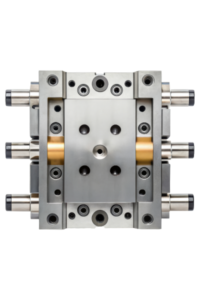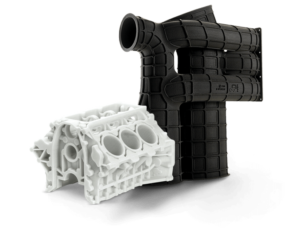PEEK Properties, Characteristics, And Applications
Product developers and engineers are faced with an overwhelming number of injection molding plastics to choose from in order to identify the optimal material for manufacturing. There are a multitude of plastic variations available, ranging from everyday commodity plastics to high-performance polymers that are utilized in extremely demanding operating environments. At Quickparts, we stock over 40 resins, and provide specific guidance to our clients on material selection.
PEEK Plastic in injection molding
Among the select group of high-performance polymers, the PAEK (PolyArylEtherKetone) family is at the forefront, and within this group, PEEK (PolyEtherEtherKetone) is the most popular choice. The reason for this is that most high-performance polymers can only withstand one or two requirements, such as the ability to withstand extreme temperature or chemical exposure, and fall short in other areas, such as wear-resistance or mechanical strength. However, PEEK possesses several of these properties, including mechanical strength, wear-resistance, heat resistance, and chemical resistance, and is also easily processed and recyclable.
In addition, PEEK possesses properties such as electrical insulation, corrosion resistance, and high purity. Since PEEK can be mass-produced through injection molding without the need for metal machining or thermoset curing, there are fewer processing steps, resulting in time and cost savings.
PEEK often outperforms metals when utilized in harsh environments, making it a popular choice for manufacturing aerospace and automotive components, medical devices, machinery parts, semiconductors, and electrical and electronic machinery.
Some examples of PEEK components include: engine parts, variable speed transmission parts, steering parts, brake components, copier claws, special heat-resistant bearings, chains, gears, endoscope parts, dental cleaners, implants, surgical devices, joint replacement, electrical insulators and isolators, battery connectors, external light housings, gaskets, seals, fittings, brackets, clamps, and thermal acoustic insulation.
At Quickparts, our experts believe it is important to understand the properties of PEEK to determine whether it is the ideal material for your specific requirements.
PEEK is a semi-crystalline, opaque material that belongs to the PolyKetone family of polymers called PAEK, which consists of aryl, ether, and ketone molecule groups. The rigidity and stiffness of PEEK are due to the aryl and ketone portions of its build-up, resulting in excellent mechanical performance and a high melting point. The ether group in PEEK provides flexibility, making it tough, and unreactivity, providing resistance to chemical exposure.
Let us take a closer look at the various properties of PEEK and how they influence material selection in different industries:
High heat resistance: PEEK Plastic in Injection Molding has a high melting point of 341°C, a high glass transition temperature of 143°C, and a continuous use temperature of up to 260°C. This makes it widely used in thermally aggressive environments, such as the oil and gas and automotive industries.
Chemical and corrosion resistance: PEEK Plastic in Injection Molding is highly resistant to water and many solvents, even when subjected to high-temperature and high-pressure steam conditions. As a result, it can withstand chemically aggressive conditions in the oil and gas industry, in sub-sea pipes, gears, and machinery. PEEK can also withstand jet fuel, hydraulic fluids, and de-icers in the aerospace industry.
Wear-resistance: PEEK is more durable than many other polymers and even some metals. It can withstand high loading at elevated temperatures without permanent deformation, known as creep. It also has a low friction coefficient, resulting in less wear, noise, vibration, and emissions. This makes it an ideal material for use in car parts. PEEK performs exceptionally well against fatigue resulting from repeated pressure and stress. It is also lighter than
About Quickparts
Founded in 1996, Quickparts & Engineering is an innovator of on-demand digital manufacturing and continues to lead advances in injection molding and rapid prototyping. We know what it takes to deliver a high quality product on time and on budget. Quickparts is engineered to be nimble, employs a team of experts in injection molding, and takes an engineer centric approach to everything we do. Tens of thousands of product developers and engineers across North America trust Quickparts to bring their products to life.
Questions? Contact our friendly sales team here or on +1 931-766-7290
.


